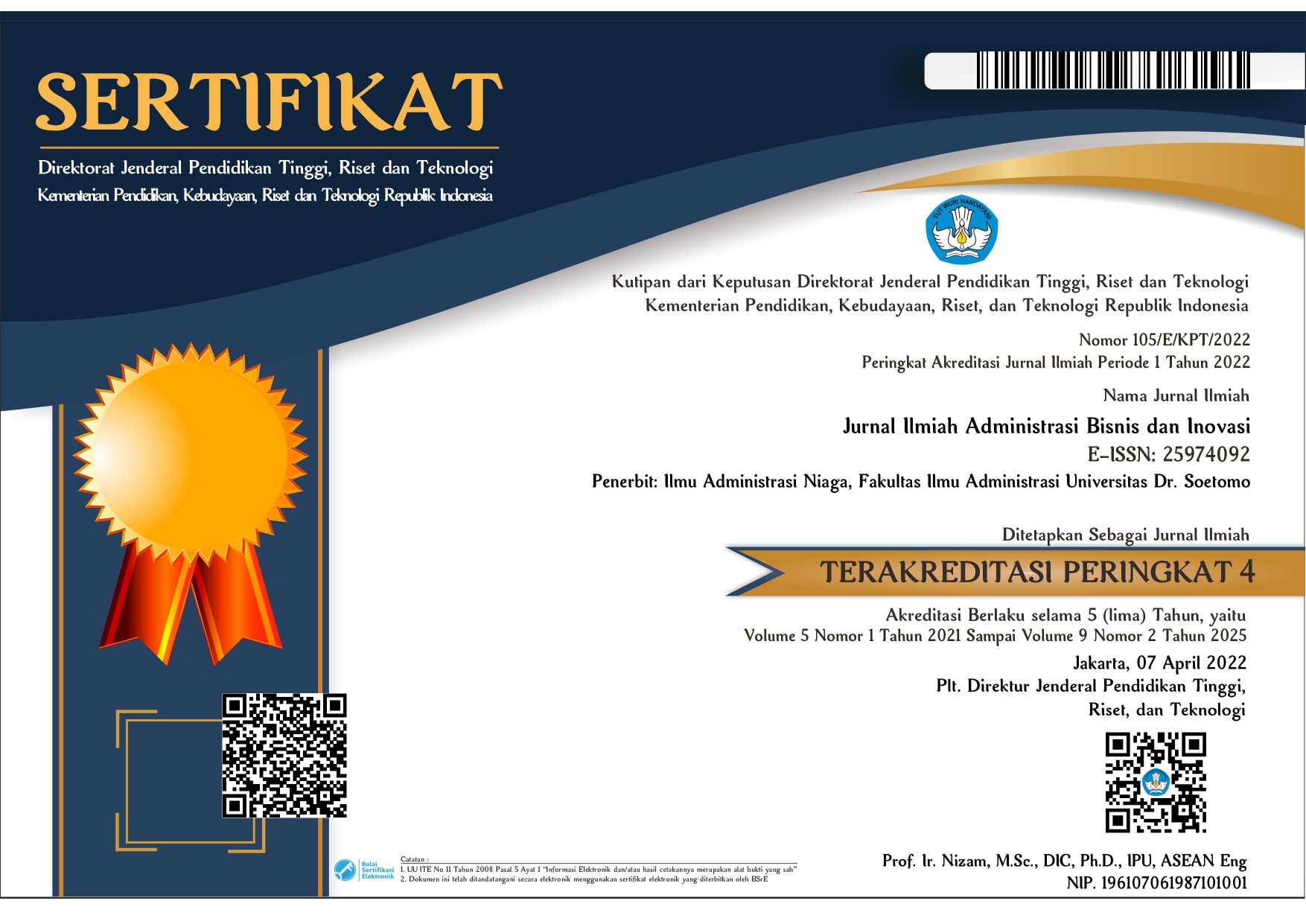Analisis Penggunaan Digital Payment QRIS pada Pelaku Usaha Mikro dan Kecil
 Abstract views: 603
,
Abstract views: 603
,
 Full Text (PDF) (Bahasa Indonesia) downloads: 600
Full Text (PDF) (Bahasa Indonesia) downloads: 600
Abstract
The aim of this research is to find out how the behavior of using QRIS digital payments by micro and small businesses (UMK) in the city of Bukittinggi is analyzed using the UTAUT method using four research constructs, namely performance expectancy, effort expectancy, social influence and facilitating conditions and adding one The moderating variable is knowledge about QRIS digital payments. Data collection was obtained by distributing questionnaires to 100 respondents to MSEs who had used digital payment QRIS which met several criteria and analyzed using SEM-PLS with the help of WarpPLS 3 software. The results in this study showed that of the four main contracts using the UTAUT method, only social influence had a significant influence. significant impact on the use of QRIS digital payments by MSEs. Meanwhile, performance expectancy, effort expectancy and facilitating conditions were found to have no significant effect on the use of QRIS digital payments by MSEs. Furthermore, different results were shown in the UTAUT method construct after being given the moderating variable of QRIS digital payment knowledge, namely that there were three contract variables: performance expectancy, social influence and facilitating conditions had a significant effect on the use of QRIS digital payments and the effort expectancy variable was moderated by QRIS digital payment knowledge. The use of digital payment QRIS shows insignificant results.
Keywords: Digital Payment, QRIS; UTAUT ; Micro and Small Enterprises
References
Herony, Richardo. 2020. “Analisis Penerapan Quick Response Code Indonesia Standar Pada Nagari Mobile Banking Dalam Meningkatkan Pelayanan Di Bank Nagari Cabang Utama.†Program Studi Administrasi Perkantoran Fakultas Ekonomi Universitas Andalas Padang 25(1):1–9.
Isa, Muhammad. 2018. “Pengetahuan, Persepsi Dan Sikap Pengurus Masjid Terhadap Perbankan Syariah (Studi Di Kecamatan Panyabungan Barat Kabupaten Mandailing Natal).†Jurnal Ekonomi Bisnis 3(1):1–19.
Jayani,Dwi Haya, UMKM Penggunaan QRIS meningkat 316% Selama Pandemi Covid-19. https://databoks.katadata.co.id/datapublish/2021/01/29/umkm-pengguna-qris-meningkat-316-selama-pandemi-covid-19.
Mahyuni, Luh Putu, and I. Wayan Arta Setiawan. 2021. “Bagaimana QRIS Menarik Minat UMKM ? Sebuah Model Untuk Memahani Intensi UMKM Menggunakan QRIS.†Forum Ekonomi (/Journal.Feb.Unmul.Ac.Id) 23(4):735–47.
Nurdin, Difa Restiti, and Rizki Amalia. 2021. “Pengaruh Media Sosial Terhadap Pengetahuan Tentang Quick Response Code Indonesian Standard (Qris).†Jurnal Ilmu Perbankan Dan Keuangan Syariah 3(2):157–73.
Sari, Arum Candra, and Hendri Hermawan Adinugraha. 2021. “Implementation of QRIS-Based Payments Towards the Digitalization of Indonesian MSMEs Arum Candra Sari Hendri Hermawan Adinugraha Abstrak Background The Covid-19 Pandemic That Occurred in 2019 Has Become the Biggest Challenge for Every Country in the World.†EKONOMIKA SYARIAH: Journal of Economic Studies 5(2).
Sarstedt, Marko, Christian M. Ringle, and Joseph F. Hair. 2017. Partial Least Squares Structual Equation Modeling.
Siregar, Dulmen Saif. 2021. Determinan Minat Menggunakan Quick Response Indonesian Standard (Qris).
Tarantang, Jefry, Annisa Awwaliyah, Maulidia Astuti, and Meidinah Munawaroh. 2019. “Perkembangan Sistem Pembayaran Digital Pada Era Revolusi Industri 4.0 Di Indonesia.†Jurnal Al-Qardh 4(1):60–75.
Venkatesh, Viswanath, Morris Michael G, Gordon B. Davis, and Fred D. Davis. 2003. “User Acceptance of Information Technology: Toward a Unified View.†MIS Quarterly 27(3):425–78.
Wills, Matthew J., Omar F. El-gayar, and Dorine Bennett. 2008. “Examining Healthcare Professionals’ Acceptance of Electronic Medical Records Using Utaut.†Issues In Information Systems 9:396–401.
Zuray, Nidia, BI : Bali Peringkat Ketujuh Jumlah Merchant QRIS Tertinggi, 27 Agustus 2021, https://www.republika.co.id/berita/qyg5jg383/network
Copyright (c) 2024 ABELYA SASTRA

This work is licensed under a Creative Commons Attribution-NonCommercial-ShareAlike 4.0 International License.
Authors who publish with Inform: JIABI: Jurnal Ilmiah Administrasi Bisnis dan Inovasi agree to the following terms:
Authors retain copyright and grant the journal right of first publication with the work simultaneously licensed under a Creative Commons Attribution License (CC BY-SA 4.0) that allows others to share the work with an acknowledgment of the work's authorship and initial publication in this journal.
Authors are able to enter into separate, additional contractual arrangements for the non-exclusive distribution of the journal's published version of the work (e.g., post it to an institutional repository or publish it in a book), with an acknowledgment of its initial publication in this journal.
Authors are permitted and encouraged to post their work online (e.g., in institutional repositories or on their website) prior to and during the submission process, as it can lead to productive exchanges, as well as earlier and greater citation of published work.








